Description
Additional information
Reviews (0)
Description
Commercial Bare Acts The Bharatiya Nagarik Suraksha Sanhita 2023 Edition 2024
Commercial Bare Acts The Bharatiya Nagarik Suraksha Sanhita 2023 Edition 2024
- The Bharatiya Nagarik Suraksha Sanhita, 2023 was introduced in Lok Sabha on August 11, 2023. It repeals the Code of Criminal Procedure, 1973. The Code provides for the procedure for arrest, prosecution, and bail for offences under various Acts including the Indian Penal Code, 1860. The Bill retains most of the provisions of the Code. Key changes proposed under the Bill include:
- Detention of undertrials: Under the Code, if an accused has spent under detention half of the maximum period of imprisonment for an offence, during investigation or trial, he must be released on his personal bond. This does not apply to offences which are punishable by death. The Bill adds that this provision will also not apply to: (i) offences punishable by life imprisonment, and (ii) persons against whom proceedings are pending in more than one offence. It further adds that first-time offenders will be released on bail if they have completed detention for one-third of the maximum imprisonment which can be imposed for the offence. The superintendent of the jail where the accused is detained must make the application seeking the release of such undertrials on bail.
- Trials in electronic mode: The Bill provides that all trials, inquires, and proceedings may be held in electronic mode. It also provides for the production of electronic communication devices, likely to contain digital evidence, for investigation, inquiry, or trial. Electronic communication includes communication through devices such as mobiles, computers, or telephone.
- Medical examination of accused: The Code allows conducting a medical examination of the accused in certain cases, including cases of rape. Such examination is carried out by a registered medical practitioner on the request of at least a sub-inspector level police officer. The Bill provides that any police officer can request for such an examination.
- Forensic investigation: The Bill mandates forensic investigation for offences punishable with at least seven years of imprisonment. In such cases, forensic experts will visit crime scenes to collect forensic evidence and record the process on mobile phone or any other electronic device. If a state does not have forensics facility, it shall utilise such facility in another state.
- Power to prohibit carrying arms: The Code empowers the District Magistrate to prohibit the carrying of arms in any procession, mass drills, or mass training with arms in public places. This may be done to preserve public peace, public safety, or maintain public order. Such prohibitions may be in place for up to six months. However, the provision was not notified under the Code. The Bill omits this provision.
- Signatures and finger impressions: The Code empowers a Metropolitan/Judicial Magistrate to order any person to provide specimen signatures or handwriting. Such an order can be given for any investigation or proceeding under the Code. However, such specimen cannot be collected from a person who has not been arrested under the investigation. The Bill expands this to include finger impressions and voice samples. These samples may also be taken from a person who has not been arrested.
- Timelines for procedures: The Bill prescribes timelines for various procedures. For instance, it requires medical practitioners who examine rape victims to submit their reports to the investigating officer within seven days. Other specified timelines include: (i) giving judgement within 30 days of completion of arguments (extendable up to 60 days), (ii) informing the victim of progress of investigation within 90 days, and (iii) framing of charges by a sessions court within 60 days from the first hearing on such charges.
- Trial in absence of offender: The Bill provides for conduct of trial and pronouncement of judgement in the absence of a proclaimed offender. This shall be done when such a person has absconded to evade trial and there is no immediate prospect of arresting him. Proclaimed offender refers to a person who: (i) is accused of an offence punishable with imprisonment of at least 10 years or death and (ii) fails to appear at a specified time and place as specified by a Court.
- Metropolitan magistrates: The Code empowers the state governments to notify any city or town with a population of more than one million as a metropolitan area. Such areas have Metropolitan Magistrates. The Bill omits this provision.
Additional information
| Weight | 0.5 kg |
|---|---|
| Authors | |
| Publisher | |
| Binding | |
| Edition | |
| Language | |
| ISBN |



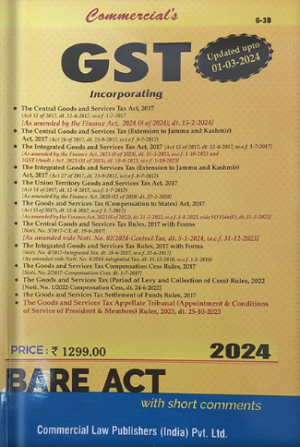
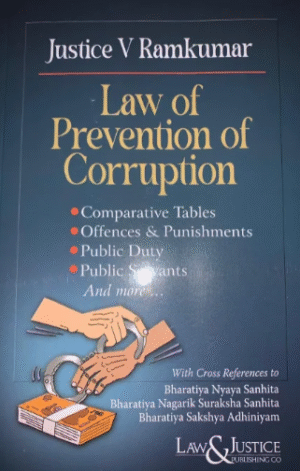
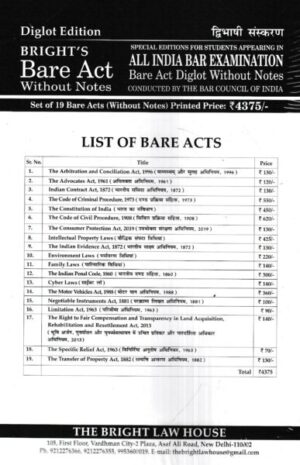
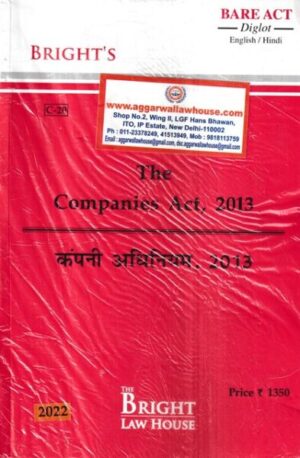
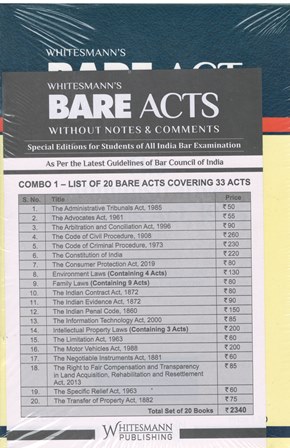
Rating & Review
There are no reviews yet.